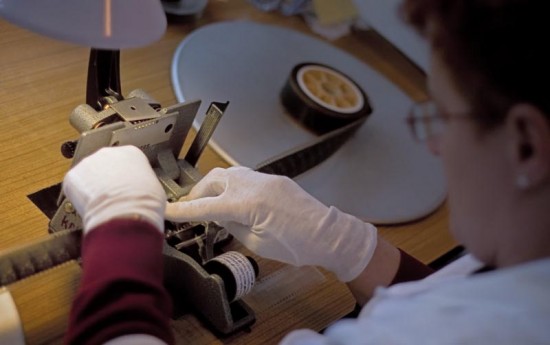
Project duration: 3Q 2008 - 3Q 2013
Project description
The project will be carried out in the following stages:
1. PURCHASE OF EQUIPMENT
The provision of specialist equipment for the Film Restoration Lab will make it possible to preserve, digitalise and reconstruct film materials on nitrate base. The equipment purchased for the project will include, among other things, a scanner for digitalisation of badly damaged archival materials on flammable nitrate base.
2. TRAINING
Due to the pioneer character of such work in Poland, the employees of the Film Restoration Lab of the National Film Archive will require training in the operation of specialised equipment, during which an exchange of experience with specialists from other film archives is also envisaged.
3. FILM MATERIAL EXPERTISE
Prior to embarking on the conservation and digitalisation work, all film materials that are preserved in the collection of the National Film Archive will have to be searched for information about particular film titles included in the project. An expertise will be performed to establish in detail how well these media are preserved in terms of image quality and to identify image deformations. The greatest challenge will be to distinguish what constitutes an integral image component and what constitutes damage. Another expertise will be performed to assess the aesthetic aspects of the image. Aesthetic consultations (in which experts from the Polish Association of Film Operators are to be involved) will enable us to establish a coherent artistic concept that will be adhered to throughout the digitalisation and reconstruction process. It will thus be possible to restore the films to their former glory and minimize the risk of deviation from the original aesthetic concept of the late filmmakers. The documents produced in these studies will provide a basis for developing a long-term plan relating to particular films and for estimating the time and resources that are required for the full restoration of other films from the National Film Archive Collection.
 fot. Krzysztof Szymański |
After the films have been described in detail, they will undergo a conservation procedure performed by the Nitrate Film Conservation Lab of the National Film Archive, who will clean the film and prepare it for the digitalisation process.
5. DIGITALISATION
The digitalisation of 43 films will be carried out in the Film Restoration Lab of the National Film Archive, outfitted with state-of-the-art equipment for digitalisation of flammable nitrate materials. Digitalisation consists in a transfer of an analogue image from a film - in this case a nitrate film - into a digital file, in a process of scanning single film frames. In this way, we obtain digital files, which are saved on the disk and serve as a digital archive. The project will enable us to preserve 43 pre-war classics in a digital form, using 4K high resolution technology. They will be available in a digital cinema format and HD television format.
6. DIGITAL RECONSTRUCTION
Pre-war archival materials must be stored, protected and preserved in a special way. The surviving original films are in an extremely poor technical condition. In order to fully restore the beauty of the image, they should undergo a process of digital reconstruction, which is very difficult and time-consuming. Individual specks of dirt and image deformations have to be removed frame by frame. Such work requires knowledge and skills, since the image must be cleaned without altering its aesthetic values (original colours, contrast, light, shot length, etc.). Sir Thaddeus, Mania. A Story of a Cigarette Factory Worker and The Call of the Sea will be the first professionally reconstructed pre-war films at the National Film Archive Collection. Other movies from the priceless collection of the pre-war cinema are also awaiting reconstruction.
7. FILM PREMIERES
The process of reconstruction will culminate in a premiere ceremony at the cinema. The projection of the restored silent movies will be accompanied by music composed especially for this occasion, performed live by outstanding artists.















